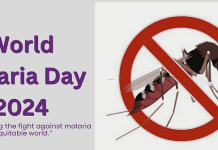/photostory/malaria-vaccine-one-year-on/malaria-vaccine-first-babies-7-cropped.jpg?sfvrsn=d0d13272_20)
Over 1.5 million children who were vulnerable to malaria morbidity and mortality in Ghana, Kenya and Malawi, have successfully been given the first dosage of the RTS, S/AS01 (RTS,S) malaria vaccine, thanks to a pilot programme managed by the World Health Organisation (WHO).
The apex health agency made this known through a press release in celebration of World Malaria Day and urged increased implementation of both new and existing interventions to save lives from malaria.
In 2019, pilots for a malaria vaccine were launched, with the goal of providing more equitable access to malaria prevention for those most in need. The WHO estimates that if the vaccine is implemented widely, it could potentially save the lives of tens of thousands of children each year.
“We have the tools to drive down malaria, a package of interventions that includes vector control, preventive medicines, testing, and treatment. These are joined by a safe and effective malaria vaccine, which could save the lives of tens of thousands children every year. With sustained investment and scaled-up efforts to reach those most at risk, malaria elimination in many countries is in reach,” said WHO Director General, Dr Tedros Adhanom Ghebreyesus.
For World Malaria Day 2023, the WHO focused on the theme – “Time to deliver zero malaria: invest, innovate, implement”. This theme emphasized the need for more effective utilization of already existing tools and strategies to stop, identify, and treat malaria, especially in populations that are disadvantaged.
The statement cited the World Malaria Report of December 2022, which revealed that there were an estimated 247 million new cases of malaria in 2021, with the WHO African Region accounting for the vast majority of cases and fatalities. Specifically, 95 per cent of all cases (234 million) and 96 per cent of all deaths (593 000) occurred in Africa, and nearly 80 per cent of those deaths were of children under the age of five.
It called for investing continually in the advancement and utilization of new vaccines and advanced tools for malaria, which will be vital in meeting the global malaria objectives by 2030.
If it is approved, the R21/Matrix-M vaccine could help to close the gap between the amounts of supply and demand, and bring down the amount of child sickness and death caused by malaria. The WHO is giving priority to the proper and efficient analysis of the R21 malaria vaccine once the data from the current phase 3 trial is made available to them.
The rollout of the RTS,S malaria vaccine in various African countries is projected to commence in the early part of 2024.













